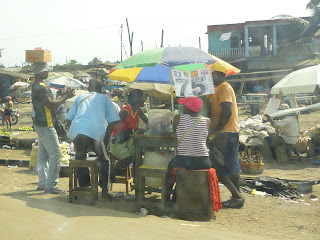As you have probably realised I have left Paul to write all the blog entries so far (he writes so well and types much quicker than me!). However, having spent the last three weeks in Cameroon I finally feel the need to put pen to paper and try to describe a country that is so completely different to anything in the developed world and can feel strangely confusing as it is so full of contrasts. The fact that it is English speaking in the west and French in the east, Christian in the south and Muslim in the north is only the start of it.
On the subject of religion Cameroonians are the most devoted, God-fearing and church-going Christians I have come across but this is mixed with the continued worship of traditional gods (mainly related to nature and the agricultural cycle) and a healthy dose of witchcraft and sorcery. Paul’s grandparents and uncle are buried in the garden of the family home in graves bedecked with Christian crosses but in the same village the use of curses is not uncommon.
The contrast that struck me the most, however, was the simultaneous high levels of chaos and stillness. The chaos is a result of the fact that much of daily life takes place on the street. Everywhere you go women sit under the shade of an umbrella selling produce, a huge range of goods is sold from rickety wooden stalls, ‘shops’ display all their wares outside and food is cooked and sold at the side of the road. Add to this the fact that what we might consider semi-industrial processes, such as car repair, furniture manufacture and wood cutting, also take place at the side of the road and the huge number of motorbikes, shared taxis and minibuses on the road, the result is an incredible level of noise and commotion.
Another big cultural difference that struck me is that Cameroonians are not big communicators. Within our family people regularly fail to talk to each other, either to make simple arrangements or discuss more fundamentally important issues. On a previous trip we went to several parties but were advised by one family member that it is impolite to ask questions as people will think you are prying, making it quite difficult to strike up conversation with a simple ‘So, what do you do?’. Yet despite this, one thing that has changed significantly in the last few years is the incredible rise of mobile phones. It has gone from there being virtually no landlines (Paul’s dad used to have the telephone number ‘10’) to everyone having a mobile phone and most of them are far more advanced than my (somewhat old) Nokia. Although this could be seen as a major development and present many opportunities quite what they use them for, given the lack of communication, is unclear!



No comments:
Post a Comment